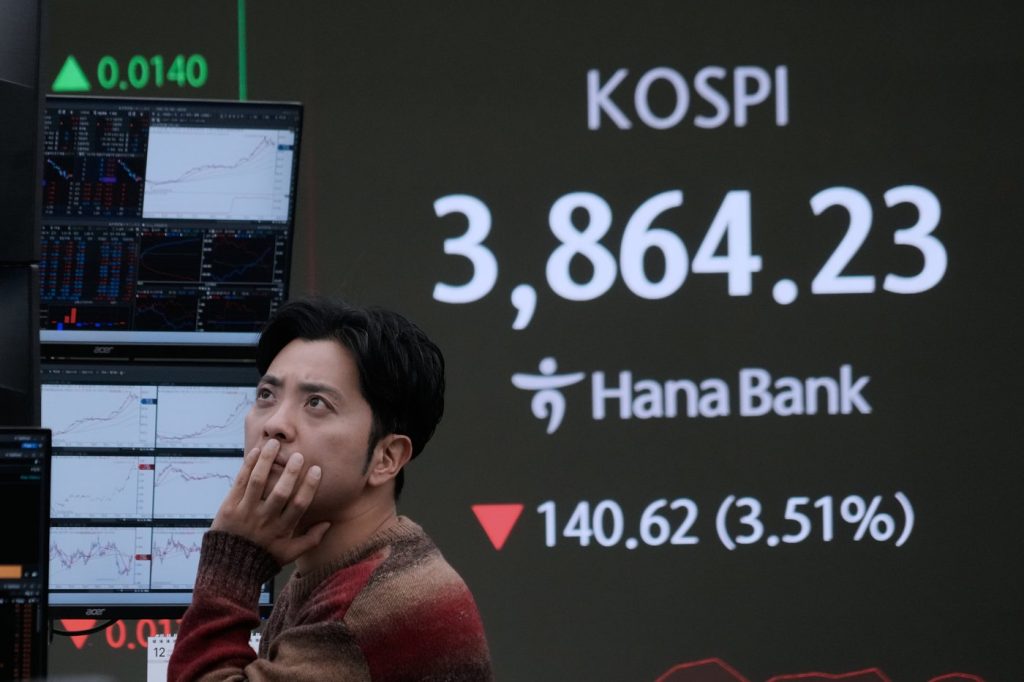On Friday, Asian stocks followed Wall Street's sharp decline, resulting in significant losses across major markets in the region. The day's trading reflected a lack of investor confidence, with Asia's key benchmarks reversing the gains made the previous day.
In the context of the market's performance, U.S. futures indicated a rise, while oil prices took a downturn. Japan's Nikkei 225 index fell by 2.4%, closing at 48,645.95, as concerns lingered over a potential bubble in shares associated with artificial intelligence. Furthermore, better-than-expected jobs data from the U.S. increased speculation that the Federal Reserve might not proceed with an interest rate cut in December.
Investors are also awaiting the announcement of a stimulus package from Prime Minister Sanae Takaichi, which includes plans for increased government spending. This has exerted pressure on the yen and Japanese government bonds. Additionally, data released showed that Japan's annual inflation rate rose to 3.0% in October 2025, up from 2.9% in September.
On an international scale, Japan reported a rise in exports to various countries in October, although exports to the U.S. decreased. The decline in U.S. exports was attributed to President Donald Trump’s higher tariffs, but increased shipments to other Asian countries helped mitigate the overall decline.
In South Korea, the KOSPI index experienced a dramatic drop of 3.9%, settling at 3,847.91, effectively reversing the gains made the prior day. Notably, major companies such as Samsung Electronics and SK Hynix saw their stock prices tumble, with declines of 5.8% and 8.6%, respectively.
Chinese markets also felt the impact, with Hong Kong's Hang Seng index plummeting by 2.3% to 25,237.94 and the Shanghai Composite index sliding 1.8% to 3,860.77. This downward momentum was, in part, fueled by rising tensions between China and Japan regarding Taiwan.
Additionally, Australia’s S&P/ASX 200 index declined by 1.5% to 8,425.30, while Taiwan’s Taiex index fell nearly 3.2%. Stephen Innes from SPI Asset Management commented on the market's volatility, noting that what began as a promising bounce back for Nvidia transformed into one of the most extreme intraday reversals observed since the market's previous downturn in April.
Wall Street had already experienced jarring swings in trading on Thursday. The S&P 500 index saw a decline of 1.6%, closing at 6,538.76. Similarly, the Dow Jones Industrial Average dropped by 0.8% to 45,752.26, while the Nasdaq composite witnessed a reduction of 2.2%, finishing at 22,078.05. The losses were particularly pronounced among previously high-flying stocks like Nvidia and cryptocurrencies, which had experienced significant growth but now faced skepticism from traders concerned about possible overvaluation.
The turbulent market conditions were primarily driven by two factors: worries about potential bubbles in AI stocks and uncertainty regarding the Federal Reserve's future interest rate policies. Although Nvidia had reported impressive summer profits, which reassured some investors about its valuation, the overall sentiment remained bearish as many traders feared missing out on future market rallies.
In the commodities market, U.S. benchmark crude oil dropped by 77 cents to $58.23 per barrel, while Brent crude also fell by 68 cents to $62.70 per barrel. Currency movements showed the U.S. dollar dropping slightly to 157.39 Japanese yen from 157.42, whereas the euro appreciated to $1.1539 from $1.1531.
The ongoing developments in the international market reflect a complex interplay of economic data, geopolitical tensions, and market sentiment, culminating in a challenging environment for investors across Asia and beyond.











